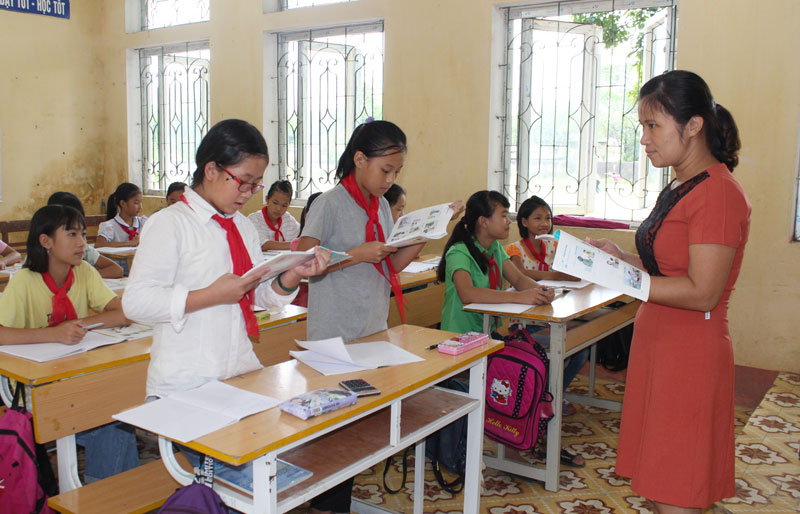
(HBO) – The issue of improving the quality of foreign language teaching and learning has been identified as one of the key tasks of the school year of 2018 - 2019.

An English lesson of 6th grade
pupils at Tan Thanh Secondary & High School (Tan Thanh commune, Luong Son
district).
In the school year of 2017 - 2018, the
Department of Education and Training concentrated on giving directions on the
organization of English teaching and learning for qualified schools in terms of
teachers and facilities. The whole province has 94.4% of primary schools
teaching English to pupils, of which 26.6% of primary pupils are learning
English 4 periods / week. 23% of secondary school pupils, 20% of high school
pupils are being taught the 10-year- English program according to the 2020
National Foreign Language Project. The Department guided to diversify the
programs and forms of training and fostering to meet the training objectives
and the need to learn foreign languages of pupils and students; taking care
of building and developing the environment of foreign language practice through
the development of foreign language learning communities. At the same time,
they continue fostering the teachers of English and foreign language teachers,
especially the foreign language teachers at high schools, to meet the
requirements of deploying the 10-year- English program. They also focus on
training about the teaching methods of teaching English to primary teachers who
have not met the standards of competence or have not been trained
professionally. 4 lessons / week is assigned for elementary school teachers
reaching grade 4 (B2) or higher according to the framework of foreign language
competence of Vietnam. At the same time, they increase the investment in
material foundations and teaching equipment; applying information technology,
renovating learning materials for teaching foreign languages; encouraging Hoang
Van Thu Gifted High School and some schools to offer bilingual English teaching
in math and natural subjects.
For general education, striving to 2020,
pupils at 73% of primary schools, 50% of secondary schools, 61% of high schools
will study the 10-year- English program; By 2025, 100% of students from grades
3 to 6 will have a chance to be studying the 10-year- English program.
For teachers, with the objectives set to
2020, 80% of primary teachers, 50% of secondary teachers and 30% of high school
teachers will meet the standardized English competence required by the level of
the schools.
In the spirit of "Party members go first, the people follow”, all households of Party members in the Doan Ket sub-region in Da Bac town, Da Bac district, voluntarily removed gates and fences, and donated land when the road expansion project passed through their properties. Inspired by their example, 68 households in the sub-region quickly followed suit, contributing over 1,400 sq.m of residential and perennial cropland to widen the main road through the residential area. The exemplary role of Party members in Doan Ket stands as a shining example of studying and following President Ho Chi Minh’s thought, morality, and lifestyle.
The Hoa Binh provincial People's Committee held a monthly meeting on May 29 to assess the implementation of socio-economic development tasks in the first six months of 2025, the progress of key projects, and some other important issues.
During his lifetime, President Ho Chi Minh always expressed his deep affection and special concern for children and youth. He once emphasized: "Caring for and educating children well is the responsibility of the entire Party and the entire people”; "First of all, the family (i.e. grandparents, parents, siblings) must do this job well”. "the Party Committees…, the Children’s Committee, the Youth Union, the education sector, and all related organizations must have specific plans to ensure children grow healthier and more progressive”. His teachings has been remaining valuable and serving as the guiding principles in the work of protecting, caring for, and educating children. In line with this ideology, Hoa Binh Province has continuously been prioritizing and investing resources in the well-being of children in recent years.
Mr. Nguyen Phi Long, the alternate Member of the Party Central Committee and Secretary of the Provincial Party Committee chaired the meeting of the Standing Committee of the Provincial Party Committee to provide opinions on several investment projects within the province. There was the attendance of Ms. Bui Thi Minh, the Permanent Deputy Secretary of the Provincial Party Committee and Chairwoman of the Provincial People’s Council; Mr. Bui Đuc Hinh, the Deputy Secretary of the Provincial Party Committee and Chairman of the Provincial People’s Committee and other members of the Standing Committee; the leaders from other departments, agencies, and some localities.
The Standing Board of the Vietnam Fatherland Front (VFF) Committee of Hoa Binh province held a meeting on May 28 to honour outstanding village elders, village heads, and reputable individuals from local ethnic minority and religious communities.
In mid-May, the provincial Museum organised an exhibition named "Duoi la co Dang Cong san Viet Nam quang vinh” (Under the flag of the glorious Communist Party of Vietnam). This meaningful activity took place in the joyful atmosphere to celebrate the country's major holidays and the Party congresses at all levels for the 2025-2030 term, towards the 14th National Party Congress.



